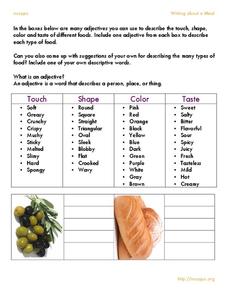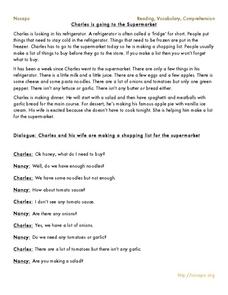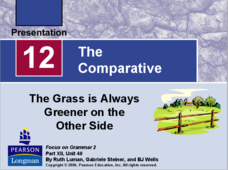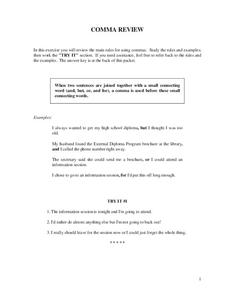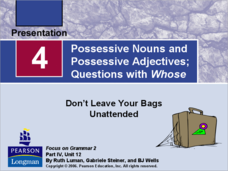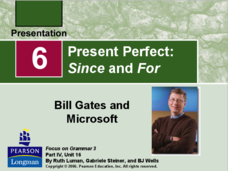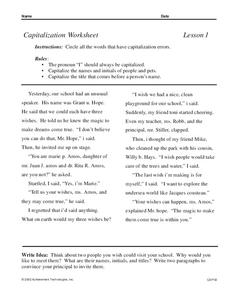Nosapo
Writing about a Meal
You don't need to be a food critic to describe your meal accurately! A series of activities introduce learners to vivid adjectives when writing about the taste, smell, and feel of food. After working with word choice, parts of a...
Nosapo
Reading, Vocabulary, Comprehension
Whether you teach mainstream elementary classes or older English learners, a set of reading comprehension resources is a great addition to your language arts curriculum. Ten activities each include a reading passage and set of...
Roald Dahl
Matilda - The First Miracle
As the story unfolds, readers discover Matilda has a superpower. Take part in an activity that has learners talking about what superpower they would have, how they would use it, and how it could help others. Then, after reading the 14th...
Wells Fargo
Wells Fargo History Museum: Curriculum Guide
Learn about the California Gold Rush from an institution that has been in place since the early days of the American West: Wells Fargo History Museum. From domain-specific vocabulary review to group research projects, an expansive packet...
Scholastic
Test-Taking Strategies for Three Subject Areas
Sometimes a test page loaded with text can make a student's face go blank. Help them decipher what a text question is asking with a series of tips focused on reading comprehension, vocabulary, and language arts mechanics.
Pearson
The Comparative
A lecture on comparative adjectives is good, but an engaging presentation is better! Take learners through the rules of comparing one thing to another with a slideshow about how some experiences can be better or worse than others.
Pearson
Questions with Any, Some, How Much, How Many; Quantity Expressions
How many times do you need to review quantity expressions? Focus on the words any, how much, some, and how many with an engaging grammar presentation.
Pearson
Advice: Should, Shouldn't, Ought to, Had Better, and Had Better Not
You shouldn't miss out on an opportunity to review should, shouldn't, ought to, had better, and had better not! Elementary and middle schoolers view a slideshow presentation that focuses on usage rules and examples for these tricky verbs.
Pearson
Will for the Future; Future Time Markers
What will happen in the future? No one knows, but everyone can guess with the future tense! Young grammarians practice future time markers with a helpful presentation that focuses on air travel to space.
Pearson
Non-Action Verbs
A verb is something you do — but can you always see the action? Use a slideshow presentation to clarify the differences between verbs that describe actions, and verbs that describe senses, preferences, and emotions.
Pearson
Subject and Object Pronouns; Direct and Indirect Object
Replacing a gift can end up in an awkward moment—but not when replacing a noun with a pronoun! Watch the most effective ways to use subject and object pronouns, as well as direct and indirect object pronouns, with an entertaining grammar...
Pearson
The Simple Past: Yes/No and WH- Questions
Were you in an accident? How did it happen? Pupils practice asking and answering questions with a language arts slideshow presentation. As they work on describing past events to explain a current condition, individuals take a look at the...
National External Diploma Program Council
Comma Review One
Commas are helpful for separating names of cities from states, setting off interjections, and listing items in a series. Practice the many uses of commas with a set of grammar exercises designed for both elementary and middle school...
Pearson
Possessive Nouns and Possessive Adjectives; Questions with Whose
Be as possessive as you like with a grammar slideshow on possessive nouns and adjectives. Whether it's your suitcase, my suitcase, or his suitcase, elementary learners decipher the ways that possessive nouns and adjectives can modify a...
Pearson
The Simple Present: Affirmative and Negative Statements
The present tense is a helpful skill to review in any language arts classroom. Focusing on statements made in the affirmative and in the negative, a slideshow presentation guides pupils through grammar rules and examples for the simple...
Santa Monica-Malibu Unified School District
Parts of Speech Pronouns: Building Blocks of Grammar
Pronouns are the most helpful parts of speech! Model the ways that interrogative, indefinite, personal, and demonstrative pronouns can specify meaning and enhance writing with a hands-on activity.
National External Diploma Program Council
Abbreviations
When should you abbreviate a word, and when should you write it out? Practice abbreviation rules with a resource that provides guided examples before challenging young grammarians to correct ten sentences on their own.
Worksheet Web
Interrogatives and Auxiliary Verbs
Interrogatives—who, what, where, when, why, and how—are the focus of a grammar worksheet that reinforces writing questions and using auxiliary verbs.
ESL Library
Beginner Level Thanksgiving ESL Lesson Plan
Thanksgiving is a cherished tradition in the United States and Canada. Introduce the beginnings of the Thanksgiving celebration with a resource that features reading comprehension activities, vocabulary exercises, and a short writing...
Pearson
Present Perfect: Since and For
Present perfect tense doesn't mean that something is perfect, just that it's continuing from the past into the present. Demonstrate proper usage of present perfect verb tense with a slideshow presentation, which features a passage about...
Achievement Technologies
Language Arts Worksheets
Looking for some quick grammar warm-ups? What about handy spelling crossword puzzles? Find everything you need with a resource that contains practice worksheets for parts of speech, parts of a sentence, common grammatical errors, tricky...
Civil War Trust
Civil War Reader's Theater
Encourage class members to add expression and put themselves back in time during the Civil War with a reader's theater activity. The scripts include dialogue on what it was like for the Union and Confederate sides during this time.
Curated OER
Sentence Structure: Sentence Types
Sixth graders identify parts that make up different types of sentences with a grammar presentation. The last few slides prompt learners to complete 10 exercises in which they indicate whether each sentence is simple, compound, complex,...
Consumers Energy
Circuits and the Flow of Electricity Lesson Plan
I think I lost an electron. Are you sure? Yes, I'm positive! Starting with a hands-on demonstration and problem solving activity, young scientists define vocabulary related to circuitry and currents. Then they build their own circuits...


